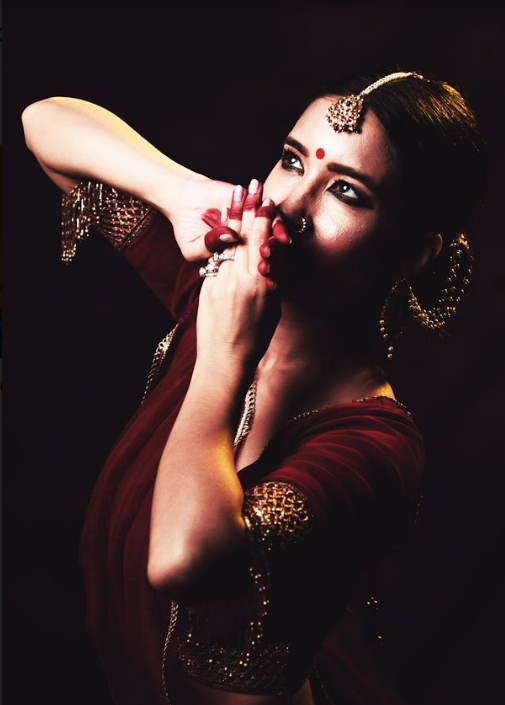
Having performed before international audiences in countries like the US, Germany, Poland, Sweden, Serbia, Latvia, Singapore, Italy, Morocco, Nepal and Bhutan, Shivani Varma has founded “Samarpan”, a cultural NGO that works to resonate Indian culture richness before evolved global audiences. Rooted in tradition, yet associated with the fashion world, she has worked closely with couturiers like Muzaffar and Meera Ali, Anju Modi, J.J. Valaya as their young muse, using Kathak as her idiom in all its technical and emotive stances.
With a host of awards under her glittering feathered cap, the danseuse has contributed a lot to the field of classical dance. In May 2017, she was awarded for her singular contribution, for the cause of harmony by the India Harmony Foundation. A recipient of the ‘NavKiran award’ in 2013, Shivani has had the honour of performing for her country at both the Opening and Closing ceremonies of the Commonwealth Games, held in Delhi in 2010. In an in-depth interview with The Daily Guardian, Shivani relates her experiences with Kathak.

Q. In the years that dance has been within you, what has been your true emotion towards the form?
A. Quoting my Guru, Pandit Birju Maharaj Ji, kathak means anand, utsah and umang. It helps connect me to my soul. The devotion I feel when I am in an ecstatic rhythm is inexplicable. My regard towards my Gurus, Maharaj Ji and Shovana Didi is unsurpassed. Their guidance, gentle prodding towards taking my performances to expert levels, has helped me realise my chosen profession and my true calling. With the feeling of godliness around me, I feel propelled to reach for the infinite, the going away from the illusory world of moh-maya into nothingness.
Strangely enough, I never wanted to become a dancer, not a professional one for sure. I started learning early on, with my mother encouraging me from ground zero. As I was growing up, I had many teachers, many mentors. They all were my angels, guiding me even if I was straying off my chosen path. It seems like synchrodestiny, opportunities falling in my lap, and me being drawn towards dance. I am where I am today, all thanks to various people who guided me. My Gurus are Pandit Birju Maharaj ji and Shovana Narayan ji.
Q. Kathak for you has evolved into an onstage drama. How did you transition into ballets?
A. I have formulated ballets with subjects like Mahatama Gandhi-Champaran Se Bapu, Devaki Ma, the city of Delhi and many others. I feel that the urban educated young generation needs to start developing a taste for the classical performing arts. It is totally imperative that culture need to be steeped into the essence of the young blood of today. It’s only about how the story is related, the literary texts, and the lyrical rhythmic song that goes with it. The finer nuances come in the adaayein (expressions), and the way the story is communicated. All my presentations are accessible to all genres of audiences. I have taken my shows abroad but never felt the need to start my own dance troupe. I like to collaborate with different artistes, and this helps my creative expression. Kathak is such a versatile dance form, so natural in its expressions, it can easily be adapted to most genres.
Q. What is your association with Muzaffar Ali and Pandit Birju Maharaj?
A. I would not have even thought of being a performing artist if it wasn’t for Muzaffar Ali Saab. I was on my way to a legal career, working in a High Court Judge’s office at the time. I met Muzaffar Saab at a restaurant opening and that’s where it all began. He gave me the opportunity to perform in Jahan-e-Khusrau, the Sufiana festival held at Humayun’s tomb annually. Over the years, I have performed in their productions. Our association is now of respect, trust and friendship. With Maharaj ji my first memory is of him taking my interview for admission to the Kathak Kendra when I was a child. The next time I met him face to face was in 2010 for another audition, this time to be selected to participate in the Commonwealth Games Opening Ceremony. As rehearsals were on daily for months, I had the time of my life! It is difficult to even stand in front of such an illustrious Guru. He has finally connected me to the reason I dance. I feel a sense of fulfillment in his presence that I have never felt before.
Q. What do you feel about fusion Kathak?
A. The way dance is presented, with a sensitive grace, and with technique, is key. I am in favour of artists experimenting with the grammar and vocabulary of movement as one can see the identity, thinking and creativity of the dancer. If done right, this form of presentation has the scope of introducing a fresh approach to keen audiences.
Q. How do you feel when you are in a vivid rhythm?
A. I feel as if I am in a dark room where nothing is visible to the eye and still I know where everything is. Every sense is heightened. There is ecstasy. But I am so in the moment that it’s the absence of feeling. I think I am still evolving in my journey as a dancer and most such moments are on stage and its sheer magic!
Q. Tell us a bit more about yourself.
A. I love travelling. If it hadn’t been for this virus, I would have been holidaying on the coasts of Amalfi, wearing my summery cotton dresses. Or relaxing in the Maldives, in our private water villa, gorging on oysters at breakfast, sipping a cool bubbly. On lazy days, I like my regular comfort food, Daal Makhni or Kadhi Chawal. When my husband Vedanta and I step out for dinner, I like dressing up in Indian attire, mostly a saree.